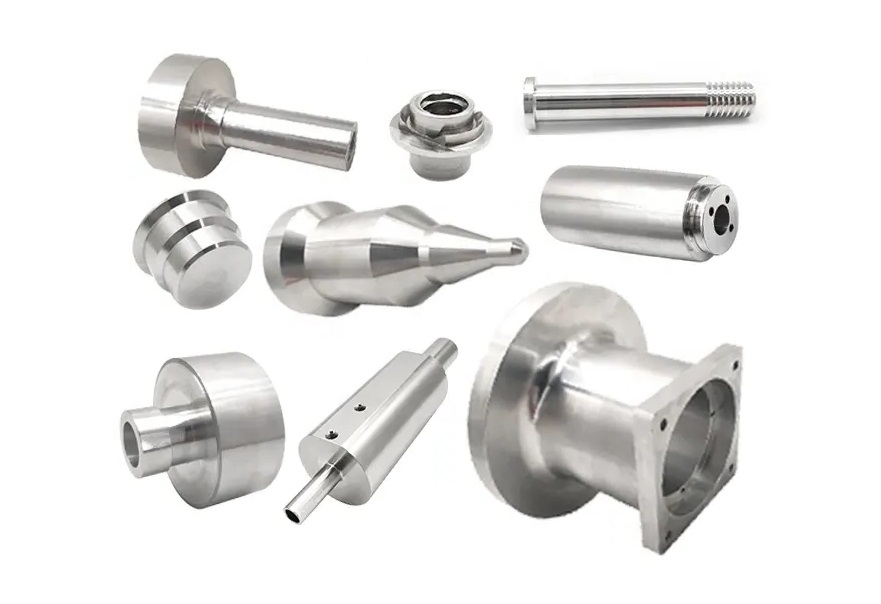How T6 and T651 Aluminum Variants Influence Product Design
 Mar 08,2024
Mar 08,2024

At Tuofa, we understand the critical role materials play in mechanical engineering and product design. This article aims to provide you with a detailed understanding of two prominent aluminum variants: T6 and T651. These materials are not just pieces of metal; they are the backbone of innovative engineering solutions.

The Essence of Aluminum in Engineering
Aluminum: a material of versatility and strength, as a lightweight and strong metal, aluminum is extensively used in various industries. Its versatility makes it an excellent choice for numerous applications. Aluminum parts account for the largest proportion of CNC machining services.
How Stock Forms and Temper Impact Usage
Choosing the right aluminum form and temper is crucial. The mechanical properties of aluminum can significantly vary based on these factors, impacting everything from machinability to durability.
As a mechanical engineer at Tuofa, I have had extensive experience with various aluminum alloys in product design. When it comes to aluminum, especially the popular 6061 grade, designers often choose between two primary temper conditions: T6 and T651. Understanding how these variants impact your design is crucial.
Table 1: Comparison of T6 and T651 Aluminum Characteristics
| Feature | T6 Temper | T651 Temper |
|---|---|---|
| Strength | High, due to artificial aging | Slightly less than T6 |
| Machinability | Good | Excellent, due to stress-relieved process |
| Weldability | Good | Very Good |
| Application | Structural applications, frames, fittings | Precision parts, where warping must be minimized |
Stock Forms
T6 Aluminum:
- Commonly found in extrusions, such as angles, channels, and tubes.
- Ideal for applications where surface finish and consistent dimensions are vital.
T651 Aluminum:
- Available in plate form, suitable for milling or other machining processes.
- The stress-relieved process makes it ideal for precise, high-tolerance applications.
How Temper Impacts Usage
T6 Temper:
- You might choose T6 when you need a balance of strength and machinability.
- It's perfect for applications like bicycle frames, where strength is a priority but precision isn't critical.
T651 Temper:
- T651 is your go-to when precision is key.
- Ideal for CNC machined parts, especially in aerospace and automotive industries where exact tolerances are imperative.
At Tuofa CNC Machining, Our engineers take an in-depth look at the differences between T6 and T651, and often guide our clients toward the right aluminum variant based on their specific design needs. Whether it's T6 for its excellent strength or T651 for its superior precision, the choice greatly influences the final product's performance and quality.
For more insights on material selection and product design, visit our website at www.tuofa-cncmachining.com. Our team is always ready to assist you in making the best material choices for your designs, ensuring they meet the highest standards of quality and performance.
The Influence of Grain and Stress Relief on Material Performance
Grain Direction and Its Significance in Aluminum Sheets: grain direction in aluminum sheets is not just a trivial detail. It influences how the material behaves under stress, which is a key consideration in product design.
The Process and Benefits of Stress Relief: stress relief is an essential step in ensuring the material's stability and performance. It plays a pivotal role in preventing warping and maintaining structural integrity.
Aluminum Alloys: T6 vs T651 and Their Role in Design
Temper Designations and Mechanical Properties: the T6 and T651 designations signify specific tempering processes, each affecting the aluminum's mechanical properties. Understanding these differences is fundamental in material selection.
Making the Better Choice: Factors Influencing Design Decisions
Choosing between T6 and T651 involves considering factors like strength requirements, dimensional stability, and post-machining operations.
Material Specifications and Standards
Understanding ASTM Specs and Common Specifications
Navigating Material Specifications: ASTM and AMS Standards: familiarity with ASTM and AMS standards is crucial for professionals in the manufacturing industry. These standards ensure that materials meet specific criteria for quality and performance.
Common Specifications for Aluminum Alloys: recognizing common specifications for aluminum alloys helps in selecting the right material for your project.
Aluminum Alloys: T6 and T651 in the Limelight
The Characteristics of Extruded and Rolled Material: understanding the characteristics of extruded and rolled materials is vital, as it influences the final product's strength and durability.
Solution Heat Treatment and Its Effects on T6 and T651: solution heat treatment plays a significant role in defining the properties of T6 and T651. It impacts the alloy's internal structure, thus its performance.
Mechanical Properties and Designation
At Tuofa CNC Machining, we deeply understand the critical role of mechanical properties in the success of your projects. Let's delve into the specifics of yield strength and material selection, and explore the significance of aluminum alloy designations.
Yield Strength and Material Selection
Yield Strength: A Key Parameter
Yield strength is the stress at which a material begins to deform plastically. Before reaching the yield point, the material will deform elastically, meaning it returns to its original shape when the applied stress is removed. Understanding yield strength is crucial in selecting materials for various applications.
How We Apply This at Tuofa:
- Material Selection for Your Needs: Depending on your project requirements, we choose materials with appropriate yield strengths. For high-stress applications, materials with higher yield strength are preferable.
- Custom Solutions: We offer personalized consultations to select the best material for your specific applications.
Material Selection: Factors Beyond Yield Strength
- Ductility: Important for applications requiring bending or shaping.
- Corrosion Resistance: Essential for parts exposed to harsh environments.
- Fatigue Strength: Crucial for components subjected to cyclic loading.
Table 2: Common Materials and Their Yield Strengths
| Material Type | Yield Strength (MPa) | Applications |
|---|---|---|
| Stainless Steel | 250-1100 | Construction, Medical Devices |
| Aluminum Alloys | 40-700 | Aerospace, Automotive |
| Titanium | 240-950 | Aerospace, Military |
| Brass | 100-550 | Decorative, Electrical Components |
The Significance of Aluminum Alloy Designations
Understanding Aluminum Alloy Designations:
Aluminum alloys are designated by a series of numbers and letters that provide information about their composition and treatment. This system, standardized by the Aluminum Association, is essential for ensuring the material's suitability for a specific application.
How Designations Guide Us at Tuofa:
- Selecting the Right Alloy: Each project might require different characteristics. For instance, a 7075 alloy is known for high strength, while a 3003 alloy offers excellent formability and weldability.
- Custom Fabrication: Understanding these designations allows us to tailor our CNC machining processes to suit the specific alloy, ensuring optimal performance and durability of the final product.
Chart 3: Common Aluminum Alloys and Their Characteristics
| Alloy Designation | Key Characteristics | Typical Uses |
|---|---|---|
| 6061 | Versatile, Good Corrosion Resistance | Structural Components, Automotive Parts |
| 7075 | High Strength, Good Fatigue Resistance | Aerospace, Military Applications |
| 3003 | Good Workability, Weldability | Sheet Metal Work, Fuel Tanks |
| 5083 | High Strength, Excellent Corrosion Resistance | Marine Applications, Pressure Vessels |
At China Tuofa CNC Machining, we not only consider the mechanical properties like yield strength but also pay detailed attention to the specific designations of aluminum alloys to ensure that the right material is chosen for your project. This meticulous approach is part of our commitment to delivering high-quality, custom-engineered solutions that meet and exceed your expectations.

Machining and Treatment Processes
Heat Treatment: T6 vs T651
Heat Treated for Perfection: Understanding the T6 Temper: the T6 temper involves solution heat treating and aging, which enhances the material's strength and resistance.
The T651 Difference: Stress Relief and Material Stability: T651 includes an additional step of stretching for stress relief, leading to better dimensional stability and resistance to warping.
Machining Aspects: Aluminum T6 and T651
Mill Considerations: Ensuring Optimal Machining Conditions: when machining T6 and T651, different considerations must be taken into account to ensure the material's integrity and the desired outcome.
Additional Machining and Finishing Requirements: Depending on the project, additional machining and finishing processes might be necessary, particularly with T651 due to its stress-relieved properties.
Application in Industrial Design
The Impact of Grain Structure and Direction in Applications
Why Grain Matters: Application-Specific Considerations: Grain structure and direction are not mere technicalities; they are critical to the performance and longevity of the final product.
Tailoring the Material to the Job: Choosing Between T6 and T651: The choice between T6 and T651 should be guided by the specific demands of the application.
Real-World Applications: Case Studies
Aerospace and Automotive: A Look at High-Performance Parts: In high-stress environments like aerospace and automotive industries, the choice between T6 and T651 can significantly impact performance and safety.
Job Shop Challenges: Custom Solutions with T6 and T651: Custom manufacturing often presents unique challenges that can be addressed through careful selection of materials, including the choice between T6 and T651.
Quality and Inspection
The Role of Residual Stresses in Quality Assurance
Identifying and Controlling Residual Stresses: Residual stresses can impact the material's performance and longevity, making their identification and control crucial in quality assurance.
Inspection Samples: Ensuring Consistency and Quality: Regular inspection of samples is key to maintaining consistency and quality in aluminum products.
From Aluminum Mill to Application Company
Tracking the Journey of a Material: Understanding the journey from the aluminum mill to the application company is essential for quality control and traceability.
Protomatic Inc and Doug Wetzel: Exemplars of Quality: Companies like Protomatic Inc, led by experts like Doug Wetzel, set the standard for excellence in aluminum machining and application.
Making the Right Choice for Your Project
Comparative Analysis: T6 vs T651 for Different End-uses
When to Choose T6: Cost-Effectiveness and Availability: T6 is often the more cost-effective and readily available option, making it suitable for a range of applications.
Opting for T651: When Additional Machining is Worth the Investment: For projects requiring high precision and stability, T651, despite its higher cost and lower availability, might be the better choice.
Aesthetic Considerations: The Impact of Cosmetic Finishes
Achieving the Desired Look: Cosmetic Finish Options: Beyond functionality, the aesthetic aspect of aluminum products is important, and different finishes can significantly alter the material's appearance.
The Bottom Line: Balancing Aesthetics and Functionality: In the end, it's about finding the right balance between aesthetics and functionality, ensuring that the product meets both practical and visual standards.
Conclusion
Summary of Key Insights
In this article, we've delved into the intricacies of choosing between T6 and T651 aluminum alloys, examining their properties, applications, and the factors influencing these choices.
Final Recommendations for Designers and Engineers
For designers and engineers in the manufacturing industry, understanding these nuances is crucial for making informed material choices that align with project requirements.
Choose China Tuofa to Custom Aluminum Parts
Our team has extensive knowledge about various aluminum alloys and their applications, ensuring the best material choice for your project. By choosing Tuofa CNC Machining for your custom aluminum parts, you're not just getting a supplier but a dedicated partner committed to bringing your vision to life with precision, quality, and care. Let's collaborate to create outstanding aluminum components that meet your exact specifications and exceed your expectations.
 Tel/WeChat:
Tel/WeChat:  Email:
Email: 
 Home
Home
 Polypropylene vs Polyethylene: Choosing the Right Material
Polypropylene vs Polyethylene: Choosing the Right Material 







